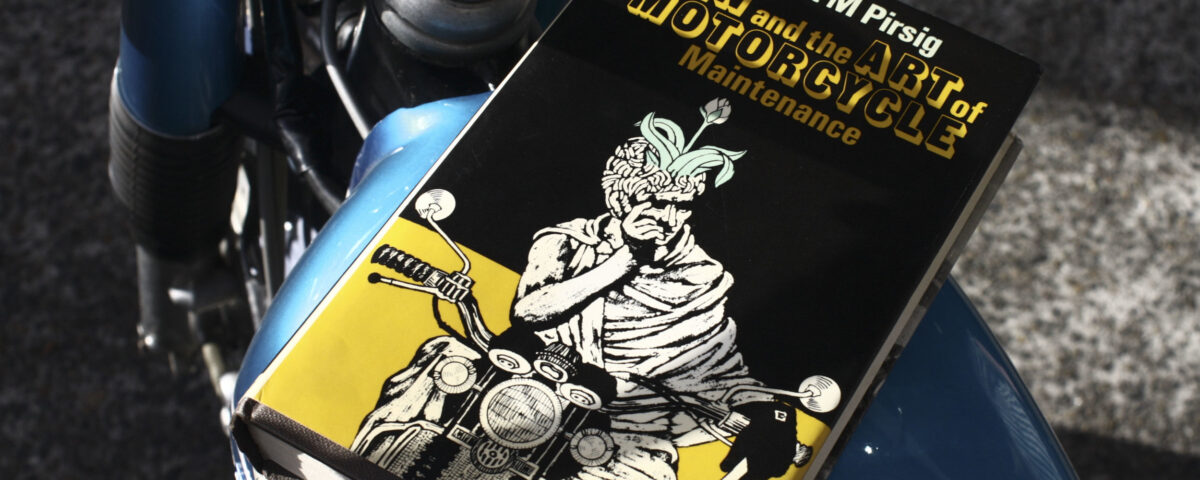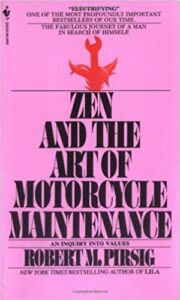The BEST: Zen and the Art of Motorcycle Maintenance

 Summary: Part autobiography and part work of philosophy, Robert M. Pirsig’s Zen and the Art of Motorcycle Maintenance: An Inquiry into Values is less about orthodox Zen and only a little bit more about motorcycles. The 1974 work, which 121 publishing houses rejected, uses the leitmotif of a father-son road trip to explore the truly examined life. Pirsig, who passed away in 2017, delves into values such as creative activity, loving relationships, handling mental illness, academic pursuits, educational theory, and, of course, mechanics.
Summary: Part autobiography and part work of philosophy, Robert M. Pirsig’s Zen and the Art of Motorcycle Maintenance: An Inquiry into Values is less about orthodox Zen and only a little bit more about motorcycles. The 1974 work, which 121 publishing houses rejected, uses the leitmotif of a father-son road trip to explore the truly examined life. Pirsig, who passed away in 2017, delves into values such as creative activity, loving relationships, handling mental illness, academic pursuits, educational theory, and, of course, mechanics.
Why this is The BEST: The author, a former aspiring professor, survived a severe nervous breakdown. In the academy, he trained as a philosopher at the University of Chicago’s elite interdisciplinary program in “Analysis of Ideas and Study of Methods” and, following his crisis, became a technical writer. His later experience gave him insight into the art of the mundane: “This divorce of art from technology is completely unnatural. It’s just that it’s gone on so long you have to be an archaeologist to find out where the two separated. Rotisserie assembly is actually a long-lost branch of sculpture, so divorced from its roots by centuries of intellectual wrong turns that just to associate the two sounds ludicrous.” Working with one’s hands to create something new and beautiful is an act of imitatio Dei. As R. Joseph B. Soloveitchik suggests in The Lonely Man of Faith, “Adam the first… is also a creative aesthete. He fashions ideas with his mind and beauty with his heart. He enjoys both his intellectual and his aesthetic creativity.”
Zen and the Art of Motorcycle Maintenance is full of precious philosophic insights, which dovetail with religious writings in general and Torah more specifically. “The truth knocks on the door and you say, ‘Go away, I’m looking for the truth,’ and so it goes away. Puzzling.” This echoes Hazal’s famous discussion of Psalms 85:12, “Truth will spring from the Earth” (Genesis Rabba 8:5). Truth is elusive and requires a constant search.
Plato’s Phaedrus hovers behind Pirsig like a ghost and functions, at times, as an alter ego from his pre-breakdown life. The alter ego pushes the search for Truth. Continuing this exploration of Truth, Pirsig offers a pointed and prolonged analysis of the role of the religious leader and the philosopher:
After these explanations he [Phaedrus] returned to the analogy of the religious church. The citizens who build such a church and pay for it probably have in mind that they’re doing this for the community. A good sermon can put the parishioners in a right frame of mind for the coming week. Sunday school will help the children grow up right…
Normally there’s no conflict but occasionally one creeps in when trustees oppose the minister’s sermons and threaten reduction of funds. That happens. A true minister, in such situations, must act as though he’d never heard the threats. His primary goal isn’t to serve the members of the community, but always God.
Remarks such as “His primary goal isn’t to serve the members of the community, but always God” could easily apply to a rabbi or teacher. On the one hand, the communal Torah leader serves at the will of his congregation or educational institution. On the other, the true calling is a summons to serve God. Leading the community closer to the religious life, sometimes despite community members’ desires, demands focus on serving a higher purpose.
The Major Theme of the Work: Quality
One of the recurring themes in Zen is the notion of “Quality.” It first appears in a recollection from Pirsig’s early days teaching writing. A fellow instructor approached him. “She came trotting by with her watering pot between those two doors, going from corridor to her office, and she said, ‘I hope you are teaching Quality to your students’… The one sentence ‘I hope you are teaching Quality to your students’ was said to him, and within a matter of a few months, growing so fast you could almost see it grow, came an enormous, intricate, highly structured mass of thought, formed by its magic.”
R. Aharon Lichtenstein’s example of reaching for excellence recalls Pirsig’s notion of “Quality.” A Yeshivat Har Etzion student once asked Rav Aharon if students should reach to excel academically in hopes of finding a high-paying job or sacrifice academic success in order to devote more time to Torah study. Rav Aharon responded that on the one hand, Torah learning required no excuse, and it was secular studies that demanded defense; however, one should apply oneself seriously to any endeavor but know the reason why. Teaching Quality should serve as a goal of Torah education, broadly.
Quality… you know what it is, yet you don’t know what it is. But that’s self-contradictory. But some things are better than others, that is, they have more quality. But when you try to say what the quality is, apart from the things that have it, it all goes poof! There’s nothing to talk about. But if you can’t say what Quality is, how do you know what it is, or how do you know that it even exists? If no one knows what it is, then for all practical purposes it doesn’t exist at all. But for all practical purposes, it really does exist.
This description rings true for those who spend time learning Torah seriously. What sets the works of some Torah sages apart is often hard to define but sensed by many.
This leads us to a parallel with Torah lishmah as a goal:
Grades really cover up failure to teach. A bad instructor can go through an entire quarter leaving absolutely nothing memorable in the minds of his class, curve out the scores on an irrelevant test, and leave the impression that some have learned, and some have not. But if the grades are removed the class is forced to wonder each day what it’s really learning. The questions, What’s being taught? What’s the goal? How do the lectures and assignments accomplish the goal? become ominous. The removal of grades exposes a huge and frightening vacuum.
This attitude holds for Torah as well. True Torah education is not about scores on exams but aims for a higher, more lofty goal. Zen can be read as almost as a work of Musar that presses for Quality or excellence in both education and life.
Like the famous quote attributed to R. Israel Salanter, Plisig focuses the energy of perfection on the self, “The place to improve the world is first in one’s own heart and head and hands, and then work outward from there.” After spending time with Zen, like the classics of Musar, one can’t help but begin a process of self-analysis and discovery. Every moment and action are worthy of reflection and improvement. Some of that improvement the reader shares with others, but much of it, like the unique techniques of personal repair of motorcycle parts, is specific to the individual and only he can perform it.
Some aspects of this work may challenge traditional Judaism. For instance, when Prisig famously says, “When one person suffers from a delusion, it is called insanity. When many people suffer from a delusion it is called a Religion.” Certainly, when reading philosophy, especially a philosophic work influenced by religious and non-religious writing, some caution must be used. But the rewards of Zen and the Art of Motorcycle Maintenance far outweigh the pitfalls, and with proper road signs and guardrails in place, one can navigate the terrain and gain much from the ride.
Rabbi Todd Berman is the Director of Institutional Advancement and a Ram at Yeshivat Eretz HaTzvi.
Click here to read about “The BEST” and to see the index of all columns in this series.
